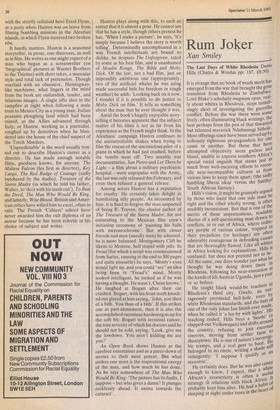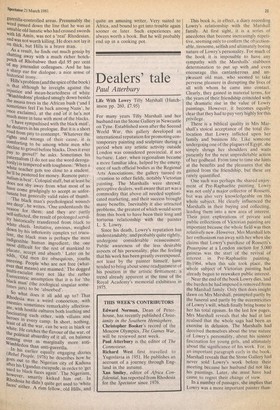Rum Joker
Xan Smiley
The Last Days of White Rhodesia Denis Hills (Chatto & Windus pp. 187, £8.50) It is strange that no book of much merit has emerged from the war that brought the grim transition from Rhodesia to Zimbabwe. Lord Blake's scholarly magnum opus, really about whites in Rhodesia, stops tantalisingly short of investigating the guerrilla conflict. Before the war there were some lively, often illuminating black writings, the best perhaps from the pen of that thwarted but talented maverick Ndabaningi Sithole. Most offerings since have been served up by tediously righteous propagandists for one cause or another. But those that have attempted objectivity seem gutless and bland, unable to express southern Africa's special racial anguish that stems just as much from well-meaning efforts to reconcile near-incompatible cultures as from vicious laws to keep them apart; (the sadly• fumbling liberal ideal versus the SmitflY/ South African fantasy). Hills's vision, it might be grumpily argued by those who insist that one side must be right and the other wholly wrong, is often muddily inconsistent. But that is one of the merits of these unpretentious, readable diaries of a self-questioning man drawn t° conflicts, in or out of Africa, where ordinary people of various colour, trapped in their prejudices (or heritage) are often admirably courageous in defending causes that are thoroughly flawed. Like all whites in Africa looking for explanations, Hills iS confused, but does not pretend not to be. All the same, one does wonder just what he thought he was doing down there in Rhodesia, following his near-execution at the hands of Idi Amin in Uganda, just a year or so before. He taught black would-be teachers in Rhodesia's third city, Gwelo, an uut• rageously provincial hell-hole, even by, white Rhodesian standards, and the butt et one of the only jokes Ian Smith ever made, when he called it 'a lay-by with lights'. His teaching ended, Hills buys a 'beetle' (a. clapped-out Volkswagen) and drifts around. the country, refusing to join escorted convoys, moving from settler farm t° shantytown. He is one of nature's incorrigible tramps, and a real gent to boot. He belonged to no circle, writing a shade seu indulgently: 'I suppose I qualify as an eccentric'. He certainly does. But he was also canny enough to know. I expect, that a white African's eccentricity is often a useful strategy ih relations with black Afreieaar.t. It probably kept him alive. He had a habit or sleeping at night under trees in the h probably kept him alive. He had a habit or sleeping at night under trees in the h guerrilla-controlled areas. Presumably the word passed down the line that he was an amiable old lunatic who had crossed swords With Idi Amin, was not a 'real' Rhodesian, and was not worth killing. He does not lay it O n thick, but Hills is a brave man. As a result, he finds out much gossip by Chatting away with a much richer hotchpotch of Rhobabwe than did 95 per cent Of my journalist colleagues. And he has a sharp ear for dialogue, a nice sense of historical irony. Hills's problem (and the spice of the book) 15 that although he inveighs against the injustice and mean-heartedness of white lAiimbledons plonked smugly down beside the insasa trees in the African bush ('and I sometimes feel I'm back among Nazis', he once exclaims), at the end of it he's not much more in tune with most of the blacks. 'I have sympathised with the black man , he declares in his prologue. But it is a short road ad from pity to contempt. 'Whatever the rights and wrongs of their cause, it s Comforting to be among white men who decline to grovel before blacks. Does it ever pay to grovel?' he asks. Sometimes his paternalism (I do not use the word derogatorily) is tempered with toughness: 'When a White teacher gets too close to a student, he'll be pestered for money. Remote paternalism is best', Colonial stuff, but at least he' does not shy away from what most of us have come grudgingly to accept as unfortunate but generally valid rules of thumb. 'The black man's psychological wounds are deep', he writes. 'One understands tin: reason for them; and they are partly s eifirmieted, the result of prolonged servilityhistorically transferred from black to white chiefs. Imitative, envious, weighed down by his inferiority complex yet truculent, the black man is perhaps the most indigestible human ingredient, the one most difficult for the rest of mankind to Placate, accept and absorb.' Later on he adds, 'Old men are obsequious, youths sneering. People who are not free (whatever that means) are maimed.' The dogged multi-racialist may not like the rather Eurocentric assumption that it is for 'the black man' (the zoological singular sometimes jars) to be 'absorbed'. So what does it all add up to? That Rhodesia was a weird concoction, with enemies sometimes remarkably affectionate, with hostile cultures both loathing and fascinating each other, with villains and heroes in every camp. In short, nothing, least t of all the war, can be writ in black or White , He catches the flavour of the war, of the political absurdity of it all, on balance coming over as marginally more antiWimbledon than anti-guerrilla. In his earlier equally engaging diaries (Rebel People, 1978) he describes how he goes out to the Nigerian city of Kaduna after his Ugandan escapade, in order to 'get used to black faces again'. The Nigerians, however, smartly kicked him out. In Rhodesia he didn't quite get used to 'white faces' either. A rim fellow, old Hills, and quite an amusing writer. Very suited to Africa, and bound to get into trouble again sooner or later. Such experiences are always worth a book. But he will probably end up in a cooking pot.







































 Previous page
Previous page